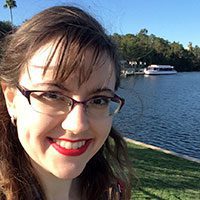By Children’s Librarian Shelley Harris
Every July, we come together to celebrate Disability Pride as a community! As a disabled librarian (neurodivergent and chronically ill), I love creating programs not only for disabled kids but celebrating us as well.
When Miss Genevieve and I lead our Disability Understanding and Advocacy field trips for elementary kids, we ask them why they think it’s important that there is a disability pride flag. I love how they answer: to show others that they exist, to show others that they love themselves, to find other people like them.
These are all so true, but most people don’t think about the idea that disabled people could have a community. So this month, the Idea Box features quotes from disabled people: activities, actors, musicians, sports players, and so many more, talking about their experiences and our communities.
“Disabled people shouldn’t have to be resilient, but I celebrate our resilience anyway. Disabled people shouldn’t have to be creative to combat an inaccessible world, but I celebrate our creativity anyway. Disabled people shouldn’t have to shout for equity and inclusion, but the chorus of our voices is a melody that brings me to tears in gratitude.”
Imani Barbarin
Watch these videos
Here are a few videos I’ve made for families about disabilities and disability experiences.
A wonderful book series, What Happened to You? is about how disabilities are a normal part of life and You Are so Awesome! is about how harmful it is to see disabled people as inspirational just for existing.
Too Much! An Overwhelming Day is a great representation of how kids with sensory challenges and disabilities can experience noise, touch, sight, and feelings differently than abled people.
Have you ever considered what words the mainstream uses to discuss and describe disabilities? Check out these neuro-affirming language tips.
Share these books
The best way to learn about disabilities and unlearn ableism—the intentional or unintentional bias against disabled people and the accommodations they need to function independently in society—is to listen to what disabled people are saying. Not their families, friends, caregivers, or educators, but disabled people themselves.
When looking for books for you & your kids, search out disability-affirming reads
Disability-affirming books:
- Center a disabled character
- Allow disabled characters to be flawed, human, and neither a burden nor an inspiration
- Show disabilities as a neutral, normal part of life, with both positives and challenges
- Are written to be enjoyed by disabled readers and not just teach able-bodied people about disabilities
- Do not rely on stereotypes and assumptions
- Are often (but not always) written by a disabled person
Explore how to evaluate a book with disabled characters (pdf) »
Check out these great disability-affirming reads
- Come Over to My House by Eliza Hull features many families, and each has a family member with a different kind of disability.
- I Am a Masterpiece by Mia Armstrong is about all the things Mia likes, like ice cream, and what she doesn’t, like being stared at.
- More Than Words by Roz MacLean explores all the ways that people communicate, whether they use their mouth or not.
- Wiggles, Stomps, Squeezes: Calming My Jitters at School by Lindsey Parker Rowe showcases a child using stims and supports like tapping, spinning, and humming to get through her school day and all of its overwhelming sensory activity. A stim is when a person uses movement or sounds to self-regulate their body and emotions. One common example is flapping hands. While an able-bodied person’s instinct is to say “quiet hands,” or something along those lines, stimming is actually a necessary tool to help focus your brain and body on the task at hand. Many kids who are neurodivergent or have sensory challenges will never be able to do their best learning in schools because of the lights, noise, sounds, and more! Techniques and supports like these stims can help, though.
And find more titles on our newly updated Disability Reads book list.
Resources to explore
Check out these resources we’ve created at the library, such as:
- Celebrating disability awareness with books and activities
- Resources for autistic people and caregivers
- Information on augmentative and alternative communication and Down Syndrome
- Local, state, and national resources for a wide variety of disabilities

About Shelley
Shelley is a children’s librarian with a passion for early literacy, serving and celebrating the disability community, and exploring technology. She can often be found practicing storytime songs with her black lab, Bingo.

